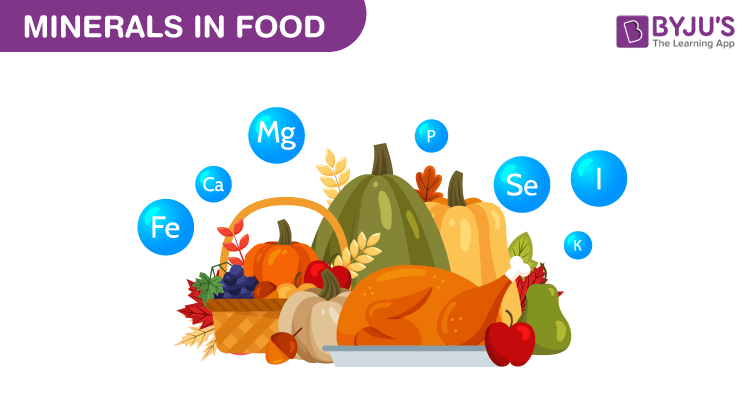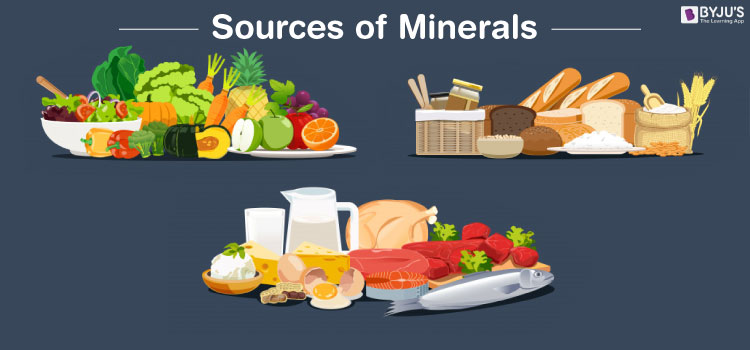There are many minerals in food; we can understand its implications better by delving into the definition and importance.
Minerals in Food Definition
“Minerals in food are the elements present in food that are required by our body to develop and function properly.”

What are Minerals and Why are they Important?
From the above definition, we can deduce that minerals are inorganic substances required by the human body to function correctly. The human body requires varying amounts of minerals daily in order to build strong bones and muscles. It also helps to maintain various bodily functions. Therefore, we obtain these nutrients from eating foods rich in minerals.
When the body does not receive enough minerals, certain nutritional deficiency diseases may arise. Goitre, Osteoporosis, Anaemia, Hypomagnesaemia, and Diarrhoea are a few examples of mineral deficiency diseases.
Minerals in Food Examples
There are many examples of minerals in food; these include:
- Calcium
- Phosphorus
- Potassium
- Sodium
- Iodine
- Iron
- Magnesium
The body also requires other minerals in trace amounts such as selenium, cobalt and molybdenum. These elements are known to have a specific function in the human body.
Types of Minerals in Food
Our body requires minerals in specific quantities. Some of them are required in large doses, while others may be required only in traces. Hence, based on the requirement of the body, minerals in food are classified into two types:
Macrominerals
- Macrominerals are those minerals which are required in relatively large doses. Therefore, they are also called major minerals.
- Macrominerals include sodium, calcium, chloride, magnesium, potassium, phosphorus, and sulfur. These minerals are vital for the proper functioning and metabolism of the body. Our body cannot produce these minerals; hence, they need to be obtained from a food source.
- The deficiency of these minerals results in severe ramifications for health. For example, calcium deficiency weakens the skeletal system, thereby increasing the risk of fractures. The deficiency of Iodine results in goitre and other hormonal disorders, and the deficiency of sodium results in hyponatremia.
Microminerals
- Also called trace minerals, these are minerals which are required in small amounts. Therefore, they are also called minor minerals. Trace minerals include iron, copper, iodine, zinc, manganese, fluoride, cobalt and selenium.
- If these trace minerals are taken in excessive quantities, mineral toxicity is induced. For instance, acute selenium toxicity is observed if an individual overdoses on dietary supplements. It can cause nausea, nail discolouration or brittleness, hair loss, and diarrhoea.
Also Read: Vitamins and Minerals
Functions of Minerals in Food
The following are some of the common minerals in food and their functions in the body.
Calcium
- Helps blood clotting.
- Helps muscle contraction and nerve function.
- Essential for building strong and healthy bones.
Chloride
- Maintains proper blood volume, blood pressure, and pH of our body fluids.
Copper
- Formation of red blood cells.
- Helps with the functioning of the nervous system.
Iodine
- Promotes the normal functioning of the thyroid gland.
- Helps in the proper functioning of brain functions.
- Promotes normal growth and development of cells.
Iron
- Helps in transporting oxygen to all parts of the body.
- Produces and stores the energy for further metabolisms.
Magnesium
- Provides structure for healthy bones.
- Produces energy from the food molecules.
- Maintains proper functioning of muscle and nervous system.
Manganese
- Helps maintain water balance.
- Controls nerve impulse transmissions.
Sodium
- Maintains cellular osmotic pressure.
- Helps in maintaining blood volume and blood pressure and fluid balance in the body.
Sulfur
- Involved in protein synthesis.
- Protects your cells from damage.
- Helps in promoting the loosening and shedding of Skin.
Phosphorus
- Helps the body store and use energy.
- Works with calcium in the formation of strong, healthy bones and teeth.
Potassium
- Controls nerve impulses and muscle contractions.
- Helps in maintaining fluid balance in the body.
- Maintains proper functioning of muscle and nervous system.
Zinc
- Aids in wound healing.
- Supports the immune system.
- Helps in the formation of strong bones.
- Controls the functioning of the sense organs in the nervous system.
- Important and essential process of cell division and reproduction.

Sources of Minerals
1. Calcium: Almonds, Carrots, Milk, Broccoli, Canned Fish, Papaya, Garlic, and Cashew
2. Chloride: Table Salt, Soy Sauce, liver Unprocessed Meat, Milk and Peanuts
3. Copper: Crab, Lobster, Mussels, Oysters, Nuts, Wholegrains and Yeast extract
4. Iodine: Seafood, Seaweed and Iodised salt
5. Iron: Meat, Eggs, Beans, Baked Potato, Dried Fruits, Green Leafy Vegetables, Whole and Enriched Grains
6. Magnesium: Honey, Almonds, Seafood, Tuna, Chocolates, Pineapple, Pecans, Artichokes, and Green Leafy Vegetables
7. Manganese: Cereals, Nuts, Oils, Vegetables and Wholegrains
8. Sodium: Table Salt, Cheese, Milk, Soy Sauce, and Unprocessed Meat
9. Sulfur: Cheese, Eggs, Nuts, Turnips, Onions, Fish, Wheat Germ, Cucumbers, Corn, Cauliflower, and Broccoli
10. Phosphorus: Mushrooms, Meat, Cashews, Oats, Fish, Beans, Squash, Pecans, Carrots, and Almonds
11. Potassium: Spinach, Apples, Oranges, Tomatoes, Papaya, Bananas, Lemons, Celery, Mushrooms, Pecans, Raisins, Pineapple, Rice, Cucumbers, Strawberries, Figs, Brussels Sprouts, and Legumes
12. Zinc: Beef, Pork, Dark Meat, Chicken, Cashews, Almonds, Peanuts, Beans, Split Peas, and Lentil
Effect of Excessive Mineral Consumption
Too much of anything is dangerous. Similarly, excess minerals intake might lead to certain illnesses in the body.
- Too much calcium in our diet may cause constipation and kidney problems.
- Excess zinc intake causes diarrhoea, heart problems, kidney malfunction, and vomiting.
- Too much sodium in blood cells increases the risk of stroke, other heart-related disorders and Hypernatremia.
- Excess iron can result in cardiovascular problems, liver disease, loss of interest in sex, infertility and impotence.
A balanced diet prevents mineral deficiencies. The use of vitamin and mineral supplements should be discouraged to prevent any adverse effects.
Also Read: Minerals
For more information on minerals in food, their definition types, functions and sources of minerals, and examples of minerals in food, keep visiting BYJU’S Biology. You can also download BYJU’S app for further reference.
Further Reading: Mineral Nutrition

This is very useful!!!!
hi